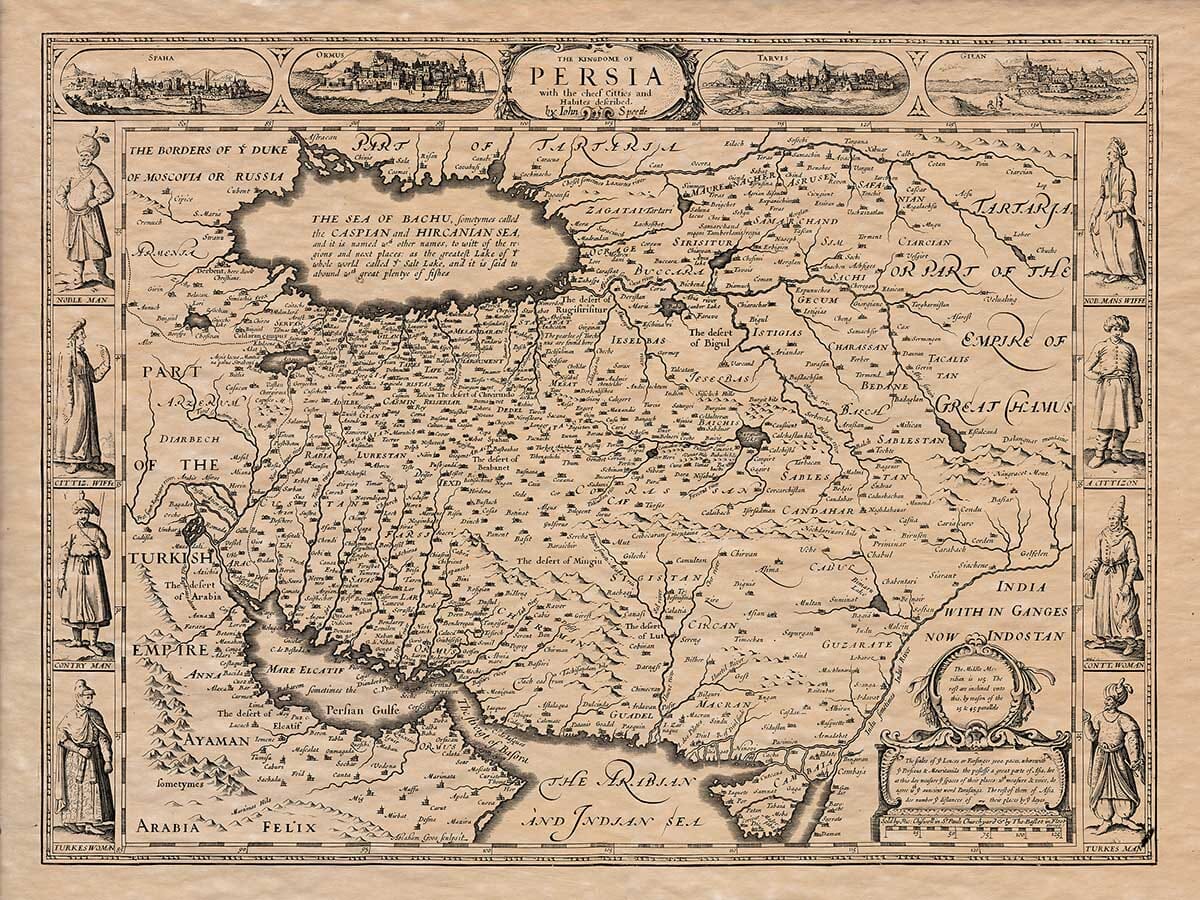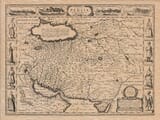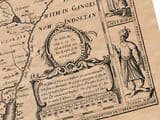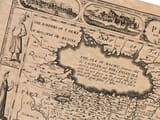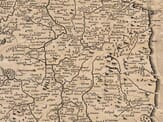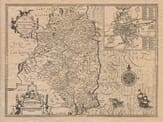Description
John Speed added historical notes which we have transcribed here. We’ve edited some old place names and certain old spellings and missing letters, etc. for clarity.
THE DESCRIPTION OF THE KINGDOM OF PERSIA
His Empire was one of the first, and most potent in the Eastern world; and though since, in several ages, she hath felt the variety of fortunes to which all Kingdoms are subject, and been forced to deliver up her glory to the succeeding Monarchies of the Macedonians, Parthians, Turks, and Saracens: yet now at last is she recovered to her own height and greatness, and the name of Persia reacheth farther than ever; if we take in (as most Geographers do) the Regions of Media, Assyria, and the rest, which were heretofore the seats of several illustrious Kingdoms.
(2) Surely the first which inhabited any part of this compass were the Medes, a people of great antiquity, who fetch both their original and name from Madai the son of Japheth: for it was not long after the Flood, that they were subdued by Ninus King of the Assyrians. One and the other, Media and Assyria, though then they had apart their peculiar Governments, yet both were but a parcel of this Country, which is now known by the name of Persia.
(3) To Ninus and his successors they continued faithful for many years, till the effeminate weakness of Sardanapalus gave opportunity to the ambition of Belochus Governor of Babylon, and Arbaces of Media, to divide his Empire betwixt them; which they did in the year of the world 3146. And then began the Monarchy of the Medes, which spread itself through the greatest part of Asia, and for above two hundred years gathered strength, till the time of Astyages, who dreamed himself out of his Empire, as Justin relates the story.
(4) Persia proprie dicta, from whence this whole Country at last took name, was at this time but an obscure Kingdom in respect of what now it is, and tributary to the Medes. Her Prince was Cambyses, the father of the great Cyrus, by Mandane, Daughter to Astyages: when she was great, and expected the time of her deliverance, her Father, touched with a perplexed dream, that she made so much water as would drown all Asia, interpreted it, that her issue should be the overthrow of this State; and therefore delivered the child which was born to her into Harpagus his charge to be destroyed; and he to the King’s Herdsman, who (unawares to both) preserved the guiltless infant, so that at last he took revenge upon his cruel Grand-father, and laid a foundation of the Persian Monarchy.
(5) In this attempt his anger wrought him no farther than his enemy: for he left the Government of Media still to Cyaxares, the son of Astyages, and afterward married his daughter, joined with him in his conquests, and till his death gave him the preeminence of title. They were both engaged in the taking of Babylon, slaughter of Belshazzar, and destruction of the Chaldeans: the Scripture gives this victory to Darius Medus, who, as most hold, was no other than Cyaxares; and he only named as the principal of the two while he yet lived, though Cyrus had his part in the action, after his Uncle’s death enjoyed it as his own, and made perfect the Monarchy of the Persians, in the year of the world 3546.
(6) About thirty-seven years after, the Succession was broken, for want of lawful Heirs to Cambyses their second King: and therefore their Princes consulted to salute him, whose horse first neighed at a set meeting upon the Court-green, before the Sun-rising. Darius Hystaspes was one, and by the subtlety of his Horse-keeper carried the Crown: for the night before, in the same ground, he had coupled a Mare with the Horse that his Master should ride; which, when the lustful steed missed the next morning, being full of spirit, no sooner had he set footing upon the place, but with much eagerness he snuffed and neighed after his Mare, and gave the cue to the other Princes to proclaim Darius King of the Persians. This was he whom the Scripture calls Ahasuerus: he was Esther’s Husband.
(7) Thus is the Empire now settled, and entailed by descent after him to that famous Xerxes, who made war upon Greece with an incredible Army, joined Asia to Europe with a bridge, and dammed up Hellespont with his Navy; yet was at last vanquished by four thousand at Thermopylae, and after by Themistocles forced to make his flight in a small boat toward his own Country, contemned of his Subjects, and within a few years slain in his Palace by Artabanus. His immediate successor was Artaxerxes Longimanus, who sent the Prophet Ezra to re-edify the Temple, and so on to Darius the last Persian of that course, who was oft vanquished by Alexander the Great, and left the Monarchy of the world to the Macedonians: after the death of their victorious Captain it was divided among many of the most potent Princes of Greece.
(8) But when the Persians saw the force of their enemy thus severed, they began to conceive a hope of recovering their liberty; and so they did indeed under the conduct and command of the Parthian Arsaces, but found themselves little bettered in their condition, as being now become new slaves to a more harsh tyrant: and therefore in the year 228 after the Incarnation, they made a second attempt to quit themselves from the Parthians: they took their time, when their Masters were sore afflicted with a strong enemy from Rome, which had broke their forces to their hands; that by the admirable prowess of another Artaxerxes, they made good their Conquest upon the Parthian, and adventured so far with the Romans themselves, that their name began to grow terrible, and the Emperor Constantine forced to fortify his Provinces, which lay toward the East; and this might be some cause too, why he removed his Seat to Constantinople.
(9) After this it fell into the hands of the Saracenic Caliphs, in the year 634, and to the Turks in the year 1030, next to the Tartars, and so again to the Parthians, by the help of Gempfas, who redeemed both his own and this from the Tartarian; and briefly after many turns, it became the possession of Ismael Sophy of Persia, whose Race continues it to this day.
(10) The bounds of this Empire on the North are the Caspian Sea, and the River Oxus; on the South the Sinus Persicus, and the Mare Indicum heretofore called Rubrum; on the West the Turkish confines, as far as the River Tigris, and the Lake Genezoh; on the East the River Indus, and the Kingdom of Cambaya: a spacious Land it is and contains from East to West 38 degrees, and about 20 from the North to South.
(11) This variety of distance in respect of the Heavens must needs cause as much difference in the qualities of her several Regions: in some places there is that fertility which makes her equal to any part of Asia; in others again she is so barren, unfruitful, and unprofitable, that the land is left as being not able to nourish an Inhabitant. Ora maritima, saith Quadrus, est uliginosa et ventosa, & frugum inops, praeterquam palmarum; mediterranea regio campestris est, et omnium ferax, pecorumque optima nutrix, fluminibus & lacubus plena; Maxime autem suppeditat Araxes plurimas commoditates. It abounds much with Metals, and Stones of great price. John Speed’s notes on his old map of Persia continue onto the following page of the atlas . . .
(12) The ancient Persians were warlike and ambitious of rule: for not content with their own, which they freely possessed…
Possest in Asia, they attempted the nearest parts of Africa and Europe, which cost them the first fall from their Monarchy. Nec enim petituri Macedones Persidem videbantur, ni priores Persæ Graeciam provocassent, saith Vadianus. Their customs were most of them superstitious, but they held nothing almost in so great reverence as water: it might not lawfully be soiled, so much as with a foul hand; but to piss, or cast rubbish, or a dead carcass into their rivers, was a kind of sacrilege. They had many Wives and more Concubines: for they were exceeding desirous of increase, and great rewards were appointed by their King himself, for him that could most augment the number of his Subjects in one year. They seldom entered into any consultation of state, till they had well armed themselves with drink; for then they thought they should be most free to speak what they most thought. To spit or laugh before their Prince was a crime well-nigh unpardonable: some say that they bury not their dead, but cast them forth to be devoured by wild beasts, and thought him most happy who was soonest torn to pieces; the rest their friends bewailed as such who had lived impurely, and were therefore by this sign declared worthy of hell only, without any redemption.
(13) Their Philosophers were called Magi, and studied principally the art of foretelling things to come; from whence we have our term of “Magick,” and usurp the word only in the worse sense (whereas questionless it was no other with them than the Greeks’ Philosophers or Sages, or Sapientes with the Latins). For it is by most thought that such were those good Magi which came from the East to worship Christ; and St. Chrysostom directly names Persia to be that East from whence they were led by the star.
(14) They have now put off most of their antique barbarism, and are become good Politicians, excellent Warriors, great Scholars, especially in Astrology, Physic, and Poetry. Those which apply themselves to mechanic trades are not inferior to any almost in our quarter: they deal most in making of Silks, which they send into all the Eastern Countries in great abundance. They are mild and courteous to strangers, yet jealous of their Wives; which for the most part are very fair and richly attired, notwithstanding their affection to them usque ad insanam Zelotypiam (even to mad jealousy): yet they are much addicted to that beastly sin of the Turks, and have their stews on purpose, whither they resort without control or shame. Their language is elegant, and in use in most of those Eastern Countries. The Christian Religion was once planted here both by St. Thomas and St. Andrew, yet are they now fallen to Mahumetanism, and differ but as Schismatics from the Turks, which occasioneth much hatred and perpetual war betwixt them.
(15) The Regions which belong to the Empire of Persia are:
1) Persia.
2) Media.
3) Assyria.
4) Susiana.
5) Mesopotamia.
6) Parthia.
7) Hyrcania.
8) Bactriana.
9) Parapomisus.
10) Aria.
11) Drangiana.
12) Gedrosia.
13) Carmania.
14) Ormus.
(16) Persis had her name from Perseus, which came hither out of Greece; and this gives it to the whole Empire. It is now called Fars or Farsistan, and was heretofore Paxchaia. It lies betwixt Media on the North, and the Sinus Persicus on her South; on her West Susiana, and East Carmania. Her Metropolis is Siras, once Persepolis, and is built toward the midland near the River Araxes: it was surprised by Alexander, and many thousand talents of Gold sent into Greece, with other rich spoils and trophies of victories, which the Persians had before gotten from most parts of the then known world. Upon the Sea-coasts stands Cyrus, a City which was built by their first absolute Monarch, and called by the Inhabitants Grecotha: it was the Bishop’s seat of the learned Theodoret, who lived here about the year 450. And in this Region is Laodicea, built by Antiochus and Pasargada, where Cyrus had his sepulchre.
(17) Media, now Servania, on the North of Persis, and South of the Caspian Sea, hath Armenia Major and Assyria on her West, and on her East Parthia and Hyrcania. It was before Cyrus the seat of the Empire, and mother to a warlike, potent Nation. Their Kings had many Wives, seldom fewer than seven; and their Women thought it a great calamity to have less than five Husbands. In this stands the Territory of Tauris, which was called by our ancients Ecbatana, and doth stand some eight days’ journey from the Hyrcanian Sea: it is rich and populous, and was the seat of the Sophies, till it was removed to Cashin, which lieth somewhat more South. Betwixt both stands the City Turcoman: and elsewhere in this Province are many others dispersed of good note; especially Saltania, Symmachia, Nassivan, Ardewil, Marant and Saucazan.
(18) Assyria, now Arzeram, on the West of Media, South of Armenia, North of Susiana, and East of Mesopotamia: it was the seat of Ninus his Kingdom, lost by Sardanapalus; and here stands the most famous City Nineve, near the River Tigris, larger than Babylon, containing full threescore miles in compass. For the community which the Babylonians had with them in course of Government, they were oft-times promiscuously used by Historians: both had this custom to sell their Virgins, which were fair and most desired, and tender the price into the common treasury. The homelier sort were placed in marriage with that money, to those who would accept of them for gain at least, if not for beauty. They were much addicted to Astrology, and were questionless led to it by the opportunity of their situation, which gives them a more perfect view of the Heavens, and several courses of the Planets, than any other part of the world besides.
(19) Susiana, now Cuceistan, seems to have her name from Chus, upon the South of Assyria, West of Persis, East of Babylonia, and North of the Persian Gulf. It is severed by Pliny from Elemais the Great by the River Euleus, of whose waters only the Persian Kings were wont to drink, as being more sweet and pure than any other in this country.
(20) Mesopotamia, now Diarbeca, heretofore Aram or Charan, lies betwixt the two Rivers Euphrates and Tigris, and hath Armenia Major on her North, and on her South Arabia Deserta: it is of large extent, and hath much variety of commodities in her several quarters; but hath suffered great calamities by reason of her continual wars with the Turk. Her chief Cities are Charan or Haran, where Abraham settled himself when he was called forth of Chaldea: and where that greedy avarice of the Roman Marcus Crassus lost his life. Not far distant is the City Nisibis, which was once called Antiochia, and Mygdonia: to these Maginus adds Merdin and Mosul.
(21) Parthia, now Arach, on the East of Media, on the South of Hyrcania, North of Carmania, and West of Aria. The inhabitants were valiant, and had their course of Sovereignty in the Eastern Monarchy. Their chief Cities are Cassan and Hispahan, which the Persian hath in great account, and which he calls his half the world.
(22) Hyrcania, now Strava, on the North of Parthia, and East of Media, and South of the Mare Caspium: it is plain, fertile, and rich. Her Metropolis Hyrcania: the rest of note are Bestan and Mesandran.
(23) Bactriana, now Charaffan, on the South, is divided from Aria by the mountain Parapomisus: her chief City Bactra, the birthplace of that great Physician Avicenna and Zoroaster Magus. This Region belongs not entire to the Sophy of Persia.
(24) Parapomisus, now Sublestan and Candahar, on the East of Aria: a mountainous Country, and the Inhabitant as rude and ragged; yet her chief City Candahar is a great market, and well frequented both from India and Cathaia.
(25) Aria, now Eri, on the East of Parthia: the Inhabitants of this Region rebelled against Alexander, but were forced by his Armies to fly for shelter into a cave upon the top of a rock; yet thither he pursued them, and dammed up the cave’s mouth with Timber, which he set on fire, and stifled most; the rest were taken to the victor’s mercy. The treason of Philotas against Alexander was here discovered.
(26) Drangiana, now Sigestan: in this Country the Hill Taurus is called Caucasus, where the Poets feign that Prometheus was perpetually gnawn by a vulture for stealing fire from Heaven. Her chief Cities are Simand and Cabul, built by Alexander, at the foot of Caucasus, and therefore called Alexandria Arachosiae.
(27) Gedrosia, now Circan, near the Mare Indicum, a barren Country, scarce worth a farther description.
(28) Carmania,—
(29) Upon the confines of the Persian Empire stands a potent Kingdom, which comprehends part of the coasts of Persia, some Islands of the Persian Bay, and a good portion of Arabia Felix near to those Seas. The chief Seat is the City and Island Ormuz, a place of great merchandise, but of itself affordeth little provision for victuals: so that they are forced to have it brought in from other parts of the Empire, though at an extreme dear rate. It abounds with a precious Pearl called the Union. Their King is now tributary to Portugal, as once it was to the Persian Emperor.

